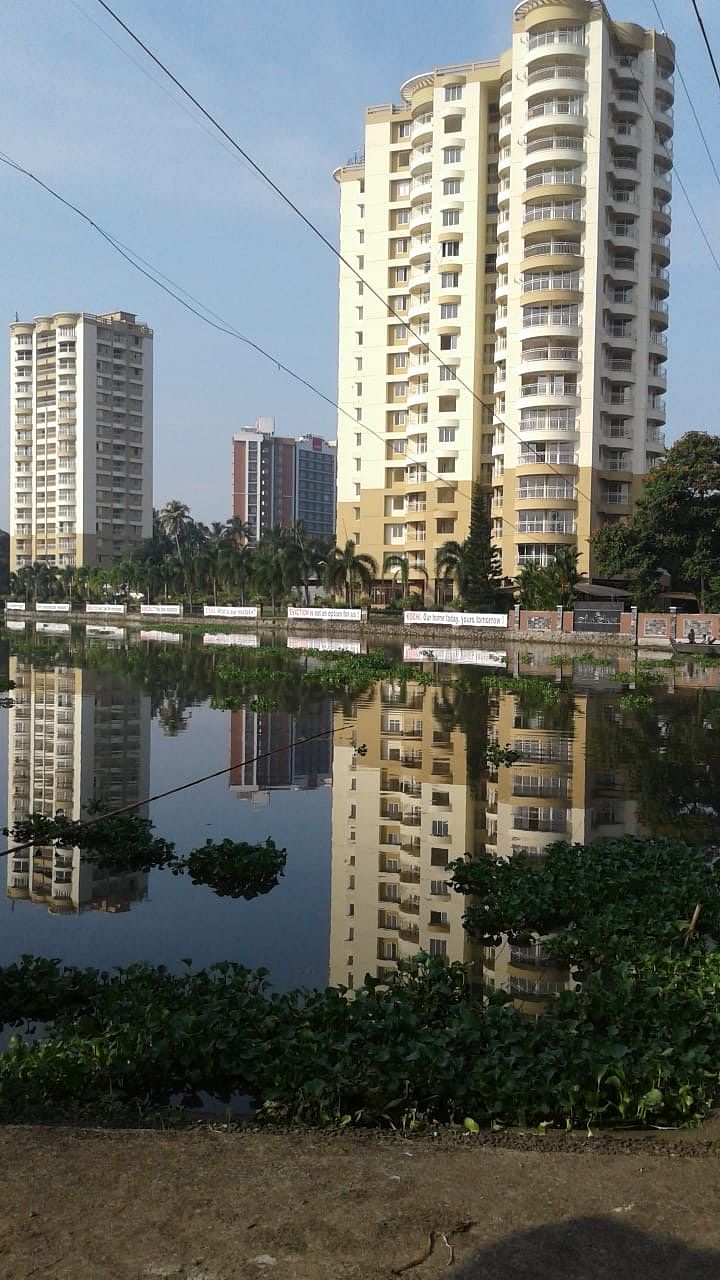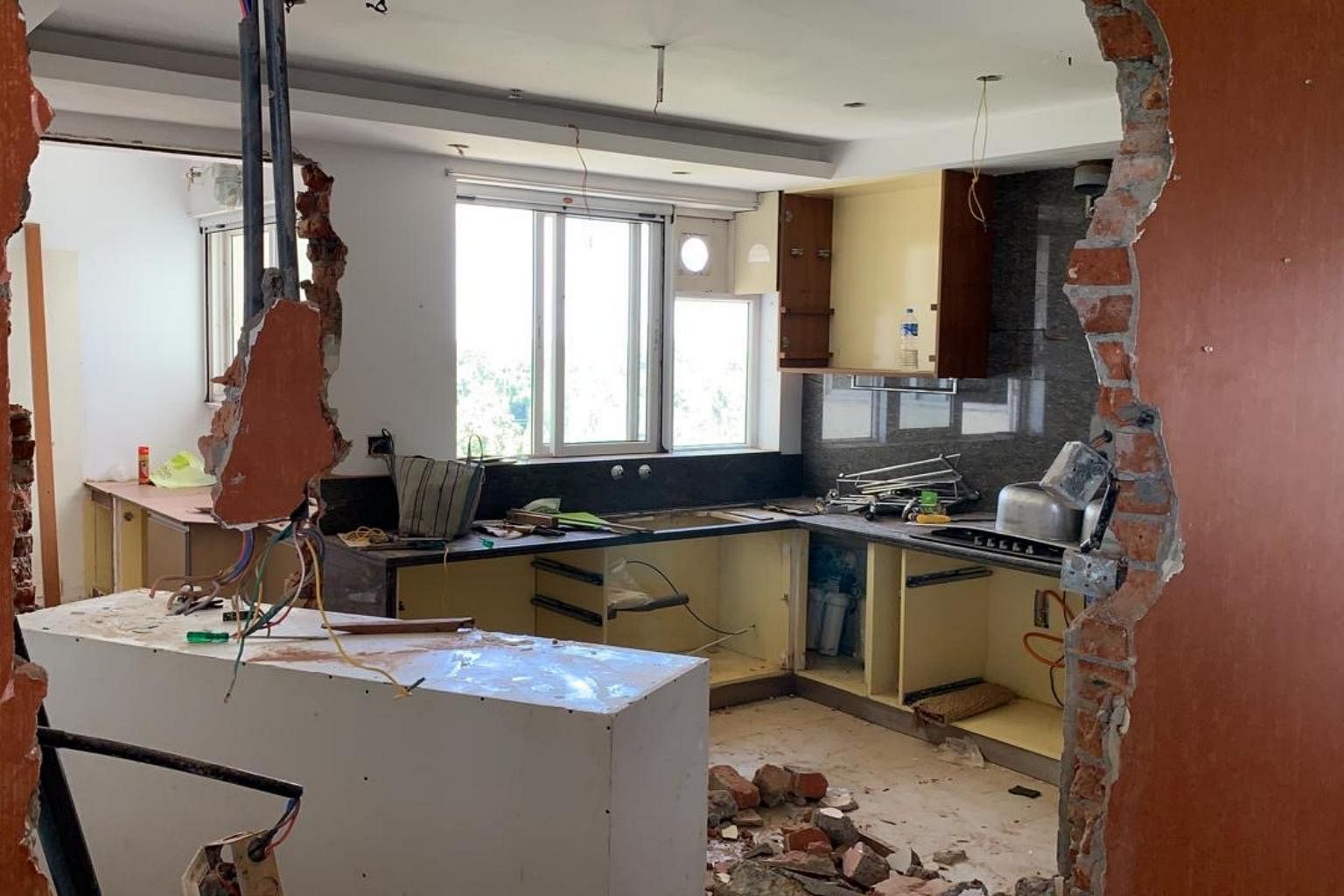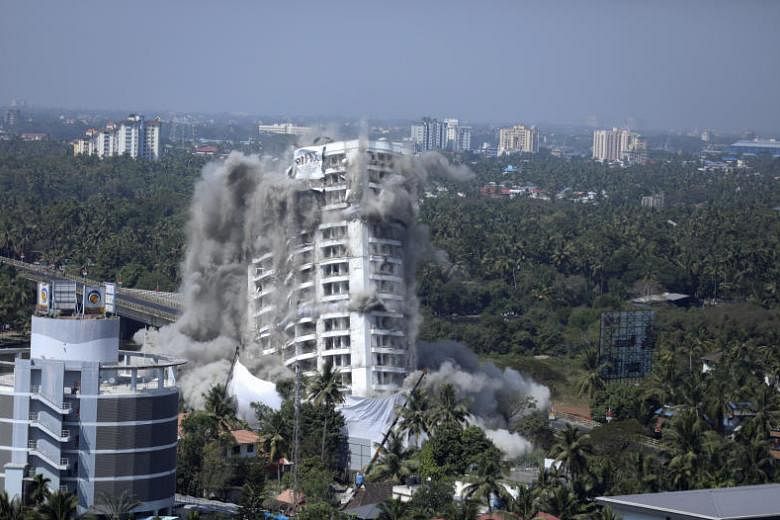BANGALORE - Mr Farhan Adam speaks of his luxury flat in Alfa Serene Apartments, Kochi, as if it were not a home, but a lucky charm. It was where the 31-year-old seafood exporter met his wife, got married, and had a daughter, who loved the swimming pool downstairs. It was where his 54-year-old father moved to after he sold his ancestral house. The family had lived there for seven years.
"Gone in 9 seconds flat" was how the Times of India described it on Jan 12.
One moment, there stood two multi-storey buildings near the Vembanadu lake, an ecologically sensitive area in Maradu, Kerala. The next, the buildings collapsed in on themselves as plumes of dust billowed out.
On Jan 11 and 12, four high-rise lakeside apartment complexes, including Mr Adam's, were demolished in a few seconds. It was a spectacle that the authorities hope will deter future violations of India's environmental norms by builders.
Last September, after over a decade of litigation, the Supreme Court said that these high-rise luxury apartment buildings in Maradu had been constructed within 200m of the Vembanadu lake, in violation of environmental rules protecting coastal zones. The court ordered the apartments to be torn down.
Among some 350 owners of the apartments were affluent businessmen, corporate professionals, a movie director, a popular emerging actor, non-resident Indians and retired bankers. The Supreme Court ordered the Kerala government to give them 2.5 million rupees (S$47,500) each as compensation.
"Is it a joke? Last year, someone bought a flat here for 13.3 million rupees. With 2.5 million, you can't even buy a 1,000 sq ft property," Mr Adam said.
In one chaotic week in October, all the residents were forced to move out.
"It was a bad scene - the lifts were flooded with water, so the elderly had to walk down 10 to 15 floors. People were crying, plucking out their 2.5 million rupee-worth flooring, doors, expensive bathroom fittings," said Mr Adam, who now rents an apartment nearby.
The urban authorities in India demolish slums and evict their residents often. But the razing of fully-built luxury apartments is almost unheard of.
The Kerala state government hired two private companies to demolish the buildings without harming the lake and neighbouring areas.


In a video circulated by officials, Mr Keven Smith, an engineer from Jet Demolitions, a South African firm, showed how the controlled demolitions would occur. Workers drilled holes into columns to place explosives, wrapping pillars with layers of steel and toughened fabric, and covering surrounding buildings to protect them from damage.
Onlookers were told to stay more than 200m away from the site.
But on Jan 11, crowds gathered to watch two of the four apartment complexes fall. Mr Adam watched too, for a sense of closure.
As the buildings fell like curtains, many in the crowd cheered and clapped.
Ms Hema Devendran, a domestic worker in Kochi, watched it on television "without blinking". "We should not cheer, but I had never thought the rich would ever face the same plight as the poor," she said.
India's wealth inequality is staggering: The top 1 per cent of the population holds 73 per cent of the wealth. About 1.8 million Indians are homeless. Social consultancy FSG finds that about 37 million Indian households live in informal housing, like slums, under the constant threat of eviction or demolition.
A flat owner from the H2O, one of the demolished apartment complexes, said: "It hurt to see people celebrating. All of us are not millionaires, you know? My wife and I took a housing loan."
The corporate professionals are now unsure about whether they will have to continue to pay loan instalments for a flat that does not exist anymore.
Flat owners were upset that corrupt or negligent government officials had gone unpunished. They asked if other ecologically unsafe constructions would be razed too.
Kerala's huge network of backwaters, lakes and rivers are fragile ecosystems but also major tourist attractions. An estimated 20,000 big and small properties in Kerala, most of them resorts and five-star hotels, are reportedly in violation of the coastal regulation rules.
Mr Adam said he still has his apartment key. "There is no lock, no door, no building even. But I don't feel like throwing the key away."
"Our case was probably supposed to be a deterrent. I pray that no one suffers like we did," he added.

But after the Maradu apartments, the Kerala government told the state court that it has issued demolition notices to 625 other buildings along the lake. More then are likely to fall soon.


